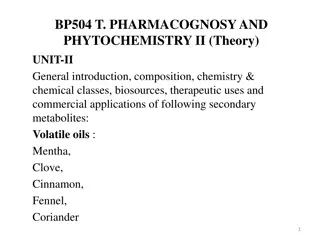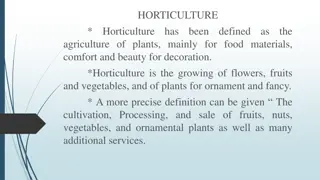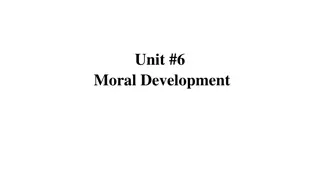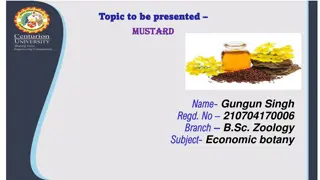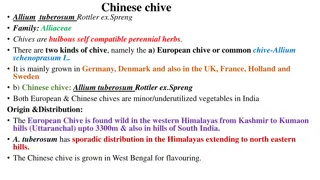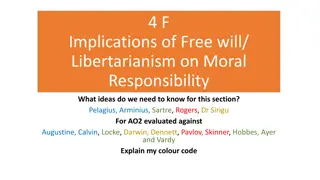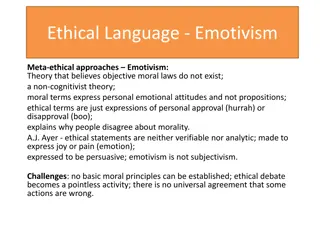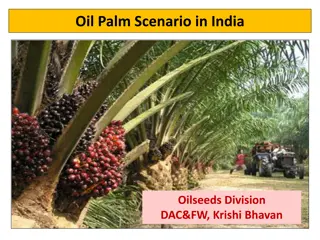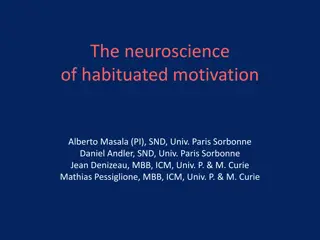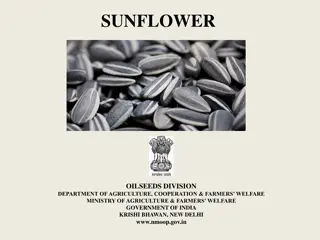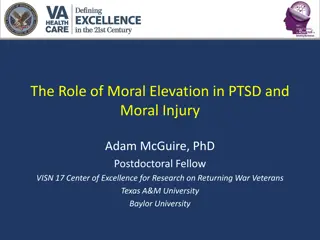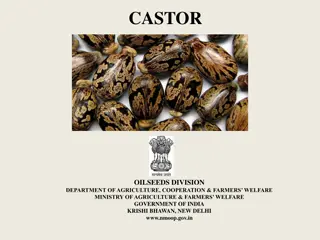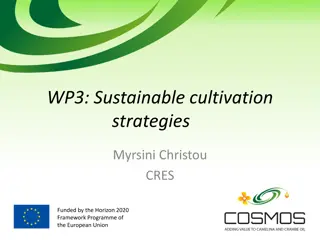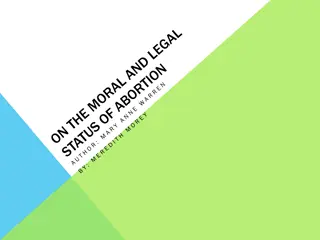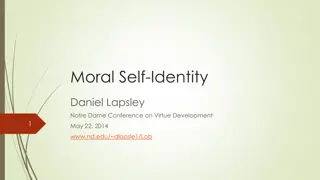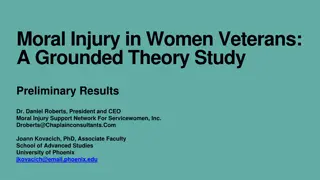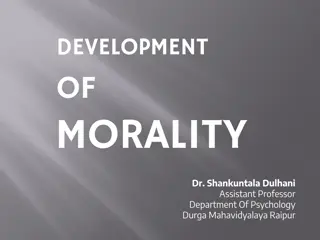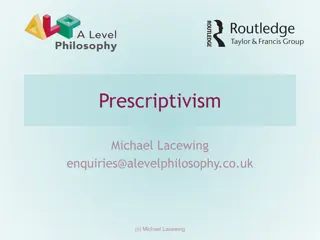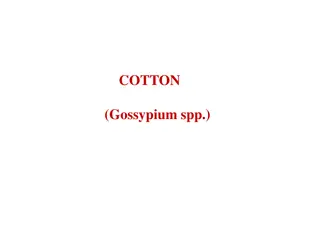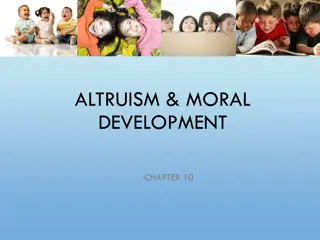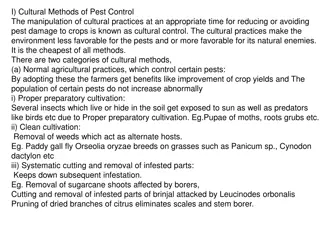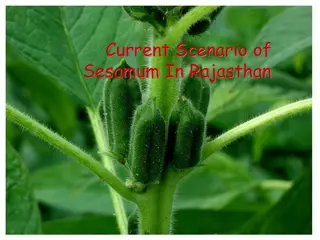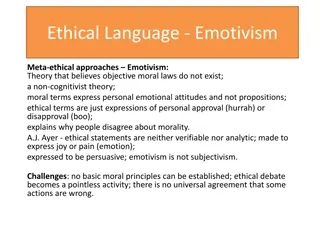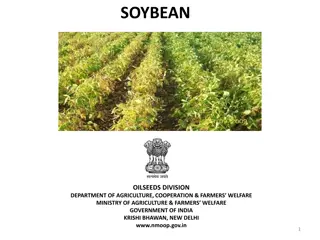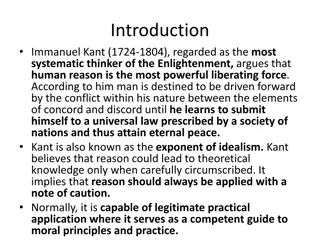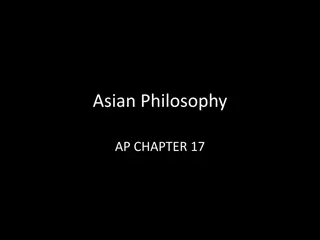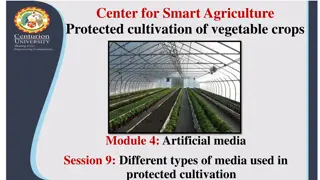Uncovering the Violent History of Capitalistic Enclosures
Explore the historical context of capitalist enclosures, their violent impacts on peasants, and the moral justifications used to conceal these atrocities. Delve into how economic narratives created moral bubbles to justify violent acts, as examined through the lens of Marx's analysis. Unveil the par
0 views • 11 slides
Cultivation and Production of Cinnamon Oil from Cinnamomum zeylanicum
Cinnamon oil, derived from the dried inner bark of Cinnamomum zeylanicum trees, has various uses and applications. This article discusses the cultivation and production process of cinnamon oil, including propagation methods, harvesting techniques, and drying processes to obtain the final product. Wi
0 views • 22 slides
Understanding Horticulture: Cultivation for Food, Beauty, and More
Horticulture involves the cultivation of plants for food, beauty, and various purposes such as decoration and landscape design. It includes the growth of flowers, fruits, vegetables, and ornamental plants, as well as services like plant conservation and landscape restoration. Unlike agriculture, hor
0 views • 10 slides
Understanding Kohlberg's Stages of Moral Development
Kohlberg's stages of moral development, built upon Piaget's psychological theory, outline six developmental stages of moral reasoning, with each stage offering a higher level of response to moral dilemmas. Kohlberg focused on justice in moral development and emphasized the importance of how individu
0 views • 19 slides
Understanding Moral Development and Moral Reasoning
Moral development involves an individual's sense of right and wrong, influenced by family, school, friends, and societal environment. Children learn moral concepts from interactions with parents, teachers, peers, and society, shaping their understanding of good and bad. Additionally, moral reasoning
0 views • 13 slides
Jute Cultivation in India: A Comprehensive Overview
Jute is a significant natural fiber crop cultivated extensively in India, primarily in the fertile Ganges Delta shared with Bangladesh. This article discusses the cultivation conditions, growth requirements, methods of cultivation, processing techniques, and India's position as a leading jute produc
5 views • 11 slides
Comprehensive Overview of Mustard Plant Cultivation
Mustard, scientifically known as Brassica indica, is a cool-season crop with origins in Europe. India leads in mustard production, with over 150 species primarily found in temperate regions. This versatile plant thrives in different soils and climatic conditions, offering a wide range of cultivation
0 views • 16 slides
Comprehensive Guide to Chinese Chive (Allium Tuberosum): Botany, Cultivation, and Uses
Chinese chive, a bulbous perennial herb, comes in two varieties - European and Chinese. Originating from the Himalayas and being grown in various regions, it is a minor vegetable in India. Known for its mild garlic-like flavor, chive leaves are rich in nutrients and used in cooking, salad, and tradi
0 views • 7 slides
Moral Responsibility and Free Will Implications in a Contemporary Context
This text delves into the implications of free will and libertarianism on moral responsibility, examining the ideas of various philosophers and thinkers such as Pelagius, Arminius, Sartre, and more. It explores the concepts of moral agency, determinism, normative ethics, religious beliefs, and the c
5 views • 12 slides
Understanding Emotivism in Ethical Philosophy
Emotivism is a meta-ethical theory that rejects objective moral laws, instead positing that moral terms express personal emotional attitudes, not universal truths. Influenced by A.J. Ayer and rejecting naturalism, this theory suggests that ethical statements are not objective propositions but rather
0 views • 28 slides
Oil Palm Cultivation and Uses in India: A Comprehensive Overview
Oil palm cultivation in India, particularly in the Oilseeds Division of DAC&FW, is detailed, covering economic aspects, requirements for success, different uses of palm oil, global cultivation statistics, and production trends in major countries. The potential benefits of oil palm cultivation, such
0 views • 31 slides
Understanding the Neuroscience of Habituated Motivation in Virtue Cultivation
Exploring the intersection of Aristotelian theory, cognitive neuroscience, and moral philosophy, this research delves into the conditions and mechanisms underlying the cultivation of virtuous habits through apprenticeship. By leveraging diverse expertise in philosophy, neuroscience, and cognitive sc
2 views • 21 slides
Understanding Catch Crops and Kale Cultivation
Catch crops are fast-growing crops cultivated during fallow periods, offering advantages like providing additional winter fodder and preventing nitrogen leaching. Kale, a popular catch crop, has a biennial growth cycle and various varieties with different characteristics. Factors like soil suitabili
0 views • 17 slides
Sunflower Cultivation: Global Scenario and Production Data
Sunflower cultivation is a significant agricultural activity worldwide, with major producing countries like Russia, Ukraine, China, and India. The plant, scientifically known as Helianthus annuus, thrives in diverse climates and contributes to oilseed production. This summary explores sunflower cult
0 views • 43 slides
Challenges and Opportunities of Moral Revolution in Indonesia
The need for a moral revolution in Indonesia to address societal issues like corruption, conflict, and intolerance. Contrasting mental and moral revolutions, the focus is on behavior change to build a humane society with healthy moral values. Initiatives and discussions highlight the urgency of tran
0 views • 13 slides
Ethical Theories: Divine Command vs. Virtue Theory Explained
Divine Command Theory asserts that morality is derived from God's commands, contrasting with Virtue Theory which focuses on developing moral virtues to achieve human flourishing and excellence. Divine Command Theory relies on religious texts, while Virtue Theory emphasizes the cultivation of virtues
0 views • 24 slides
Understanding Moral Elevation in PTSD and Moral Injury
The research by Dr. Adam McGuire explores the role of moral elevation in PTSD and moral injury, emphasizing how witnessing virtuous behaviors triggers emotional and physical responses leading to a desire for imitating virtuous acts. By integrating prosocial emotions into trauma treatment, the positi
0 views • 13 slides
Overview of Castor Oilseed Cultivation in India
Castor oilseed cultivation in India is a significant agricultural activity, with detailed information on botanical description, seasonal preferences, global vs. national scenarios, major producing countries, national scenarios, and key growing states. The content sheds light on cultivation practices
0 views • 33 slides
Sustainable Cultivation Strategies for EU Crops
This project, funded by the Horizon 2020 Programme, aims to develop sustainable cultivation strategies for various crops in the European Union. Tasks include geographic allocation, trials, sowing strategies, irrigation/fertilisation trials, crop rotation, field tests, and scenarios for raw materials
0 views • 24 slides
Understanding Humanity and Moral Community in the Context of Abortion Ethics
Exploring the complex ethical considerations surrounding abortion, this discussion delves into determining the humanity of a being, defining the moral community based on traits of personhood, fetal development, and the right to life. The arguments include the morality of abortion, the definition of
0 views • 9 slides
Challenges to Moral Anti-Realism: Objections and Responses
The article explores objections to moral anti-realism, including moral nihilism, condemning immorality, and the notion of moral progress in the absence of moral reality. It addresses concerns about the justification for interfering with others' behavior, the relationship between moral beliefs and ob
0 views • 6 slides
Understanding Moral Self-Identity Development
Situating moral self-identity within ethical theory and developmental psychology, this overview explores the centrality of morality within the self-concept. It discusses the chronic accessibility of moral schemas, the importance of strong evaluation in moral behavior, and the connection between mora
0 views • 33 slides
Understanding Moral and Constitutional Values in Relation to Judiciary
Explore the concepts of moral values and constitutional values, emphasizing their importance in decision-making processes and societal norms. Discover the stages of moral development and delve into constitutional values such as sovereignty, socialism, secularism, democracy, justice, liberty, equalit
0 views • 9 slides
Analysis of Moral Language in Political Communication
Explore how Republican and Democratic elites use distinctive moral language and its impact on voters in the context of the 2012 election data. Discover the application of Moral Foundations Theory in understanding political differences in the United States and how moral intuitions influence public op
0 views • 13 slides
The Influence of Disgust on Moral Behavior in Psychological Research
Explore the impact of disgust on moral behavior through various studies, including moral dilemmas and criteria for moral judgment. Research delves into how disgust affects decision-making processes related to moral dilemmas and helping behavior. Discover the connection between physical disgust and i
0 views • 16 slides
Understanding Moral Distress in Healthcare
This content discusses the concept of moral distress in healthcare, defined as the pain and anguish experienced when one knows the right thing to do but faces internal or external barriers preventing action. It explores the implications of moral distress on healthcare practitioners and emphasizes th
0 views • 25 slides
Insights on Moral Injury Among Women Veterans: Preliminary Study Findings
Preliminary results from a grounded theory study on moral injury in U.S. women veterans reveal themes such as sexual assault, hostile work environments, and more. Participants shared their experiences, highlighting the nature of moral injury they faced, distinguishing between various forms of discri
0 views • 21 slides
Understanding Moral Development: Insights and Perspectives
Morality is the belief in right behavior accepted by society. It involves moral behavior, feelings, and judgments. Moral development evolves from childhood to adulthood, influenced by experiences and challenges. Freud's id, ego, and superego theory and Skinner's behaviorism contribute to our underst
0 views • 12 slides
Exploring Moral Judgments and Prescriptive Meaning in Ethics
This content delves into non-cognitivism, Hare’s prescriptivism, and moral anti-realism to understand what we do when making moral judgments. It discusses prescriptive meaning, the concept of good, and how moral language guides actions. The objections raised regarding moral language's functions, p
0 views • 9 slides
The Importance of Cotton Cultivation in Commercial Agriculture
Cotton, a crucial commercial crop globally, plays a significant role in the economic, political, and social aspects of various countries. Cultivated in tropical and subtropical regions, cotton requires specific climatic conditions for successful growth and yield. The crop season varies across differ
0 views • 24 slides
Understanding Altruism and Moral Development Theories
Explore the components of morality, theories of moral development by prominent psychologists like Piaget and Kohlberg, and the stages of moral development in individuals. Learn about moral affect, reasoning, and behavior as integral aspects shaping one's ethical framework and decision-making process
0 views • 40 slides
Cultural Methods of Pest Control in Agriculture
Cultural methods of pest control in agriculture involve manipulating cultural practices to reduce or avoid pest damage to crops. These practices create an environment less favorable for pests or more favorable for their natural enemies, ultimately improving crop yields and minimizing pest population
0 views • 14 slides
Friedrich Nietzsche's Genealogy of Morals: Uncovering the Evolution of Moral Values
Friedrich Nietzsche critiques traditional philosophy for overlooking the historical development of moral concepts. He argues that moral judgments were initially based on strength and power, later evolving into the dichotomy of master and slave morality. By tracing the genealogy of moral terms, Nietz
0 views • 10 slides
Challenges and Opportunities in Sesamum Cultivation in Rajasthan
The current scenario of Sesamum in Rajasthan reveals fluctuating production and export trends, along with challenges such as low productivity, seed replacement rates, and cultivation constraints. Insect pests and major diseases pose threats to Sesamum crops, while the region showcases varieties like
0 views • 15 slides
Understanding Emotivism: A Non-Cognitivist Theory in Ethics
Emotivism is a meta-ethical theory that posits the absence of objective moral laws, suggesting moral terms express personal emotional attitudes rather than propositions. Influenced by philosophers like A.J. Ayer and Hume, it challenges the existence of basic moral principles and universal agreement
0 views • 23 slides
Comprehensive Overview of Soybean Cultivation in India
Soybean cultivation in India, spearheaded by the Soybean Oilseeds Division under the Ministry of Agriculture & Farmers Welfare, Government of India, boasts a rich history tracing back to ancient China. The crop is known for its adaptability to diverse climates and soils, with specific sowing seasons
0 views • 20 slides
Kant's Moral Philosophy: Reason, Freedom, and the State
Immanuel Kant, a prominent Enlightenment thinker, emphasizes the liberating power of human reason in guiding individuals towards moral principles and practices. Kant's moral philosophy centers on treating each person as an end-in-itself, driven by the good will informed by reason. His concept of mor
0 views • 14 slides
Development of Confucianism in Ancient China
During the Warring States Period in ancient China, Confucianism emerged as a response to the chaos and societal collapse. Confucianism, along with other philosophies like Daoism, Legalism, and Mohism, offered different solutions to restore order and harmony in society. Key figures like Mengzi and Ha
0 views • 27 slides
Understanding Different Types of Artificial Media for Protected Cultivation
Exploring soil-less media for growing horticultural crops, this module delves into the advantages of using artificial media in protected cultivation. From soil mixes to peat, perlite, and vermiculite, learn how these components offer benefits like improved aeration, nutrient control, and labor effic
0 views • 21 slides
Forms of Moral Reasoning and Ethics in Decision-Making
Explore the main forms of moral reasoning in ethical decision-making, including virtue ethics, deontological reasoning, and teleological reasoning. Understand the importance of developing ethical virtues and principles in guiding behavior. Delve into examples of reasoning from virtue and deontologic
0 views • 28 slides

